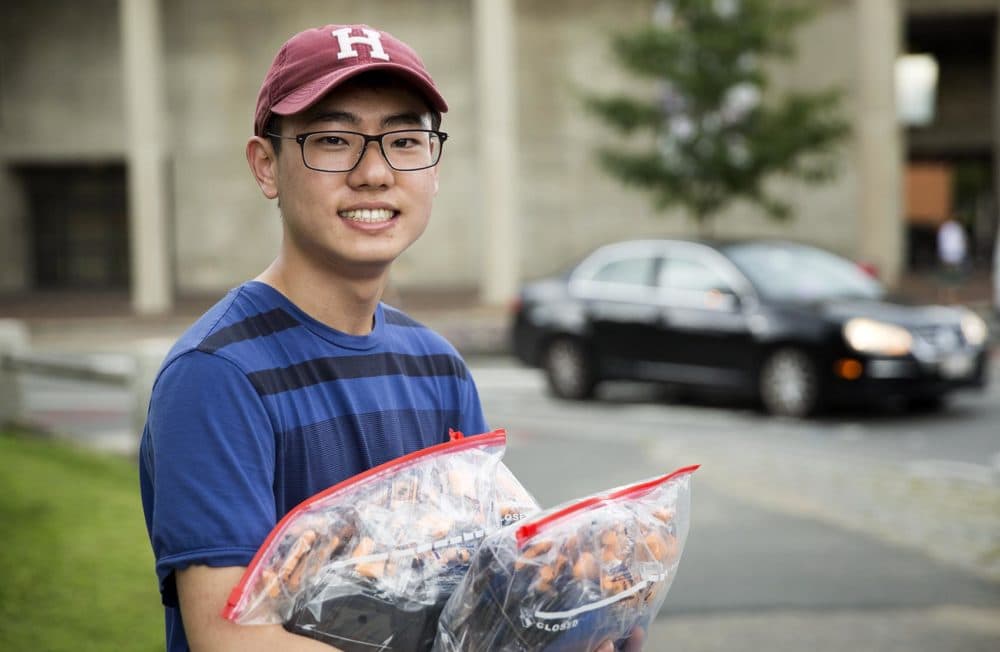Advertisement
Sleep 101: Harvard Freshmen Required To Take Sleep Course Before School Begins

At a start-of-school wellness fair called "Happy Healthy Harvard," new students learn about nutrition, exercise and study habits — and then there's the table manned by Raymond So, a sophomore from Silicon Valley.
"These are eye masks and earplugs," he tells a freshman, handing over a big plastic bag filled with them. "Could you give them to your proctor?" And, he adds, "Could you fill out a survey on Sleep 101?"
Classes don't start until Tuesday at Harvard, but freshmen have already taken a course that could affect their lives in college and beyond.
For the first time, Harvard is requiring that all incoming first-year students complete an online course about sleep health before coming to campus.
Research finds that college students tend to sleep too little and too erratically — habits that can affect everything from mental health to athletic and academic performance.
"College students pull all-nighters in order to do great in their exams, and that's kind of the worst thing they can do," says media celebrity and sleep champion Arianna Huffington in the course's introductory video. "Because memory consolidation is harder, retrieval of information is harder, everything is harder when we're sleep-deprived."
The course, which takes about 45 minutes, goes on to include practical information on how to optimize sleep and what can get in the way.
At Harvard, the impetus to teach better sleep arose from a freshman seminar taught by leading sleep researcher Dr. Charles Czeisler. He highlights three main factors in healthy sleep: "The first one is making sure that you have enough time for sleep. The second is, be consistent, and so the timing of sleep is very important as well. And third is the quality of sleep."
Advertisement
Last year, Raymond So was among Czeisler's seminar students. For his class project, So approached the Undergraduate Council about some church bells that ring loudly in the mornings near the freshmen dorms on Harvard Yard, and often woke him up.
"To be honest, my first proposal was to delay the onset of the church bells, but for obvious reasons — for historical and traditional reasons — they said no," So says. "So I tempered down my proposal into a sleep education platform, and this is where we're at right now."
The bells will still ring early. But the school backed Sleep 101, and the course is now required for the more than 1,600 students that make up the Class of 2022.
Freshman Michael Chen, of Delaware, says he appreciated the pointers it gave him on sleeping instead of cramming for exams, and avoiding screens before sleep.
"I definitely like checking my phone and my computer before I go to sleep," he says, "and trying to put that away about 30 minutes before I go to sleep is definitely something I've been trying to do." Instead he tries to read or write, he says.
Freshman Shuvom Sadhuka, of Cambridge, says he's going to aim for a regular midnight to 8 a.m. sleep schedule. The course could help shift overall attitudes about sleep, he says.
"I think a lot of students who are very high-achieving have this mindset that the less sleep you get, the cooler you are," he says. "And definitely, in college, I don't want to have that mindset, and I don't want to be feeding into that mindset. I hope that other kids have also learned that."
That's the kind of shift that So is hoping to help bring about: away from what can seem like a competition over who can do more and who can function with the least sleep.
"I think most people tend to believe you can't have good grades, a good social life and a good sleep schedule," he says. "But I think, through Sleep 101, we emphasize that you can have all three, and it starts with good sleep every night."
Dr. Czeisler, who directs the Sleep Matters Initiative at Brigham Health and helped develop Sleep 101, says his greatest hope is "that Sleep 101 is just a first step toward changing the culture."
The students in his freshman seminar have looked at multiple ways that college life can get in the way of healthy sleep, he says. For example, problem sets that are due at 8 a.m. tempt students to work through the night — and very early morning weight-lifting sessions for football players can throw off their sleep patterns.
"So my hope is that this will empower students to recognize why sleep is important," Czeisler says, "and what's required to make sleep a priority, including the duration, consistency of timing and quality of sleep. And then they'll begin to say, 'Hey, why are these things interfering with my ability to get good quality of sleep?'"
This segment aired on September 3, 2018.
